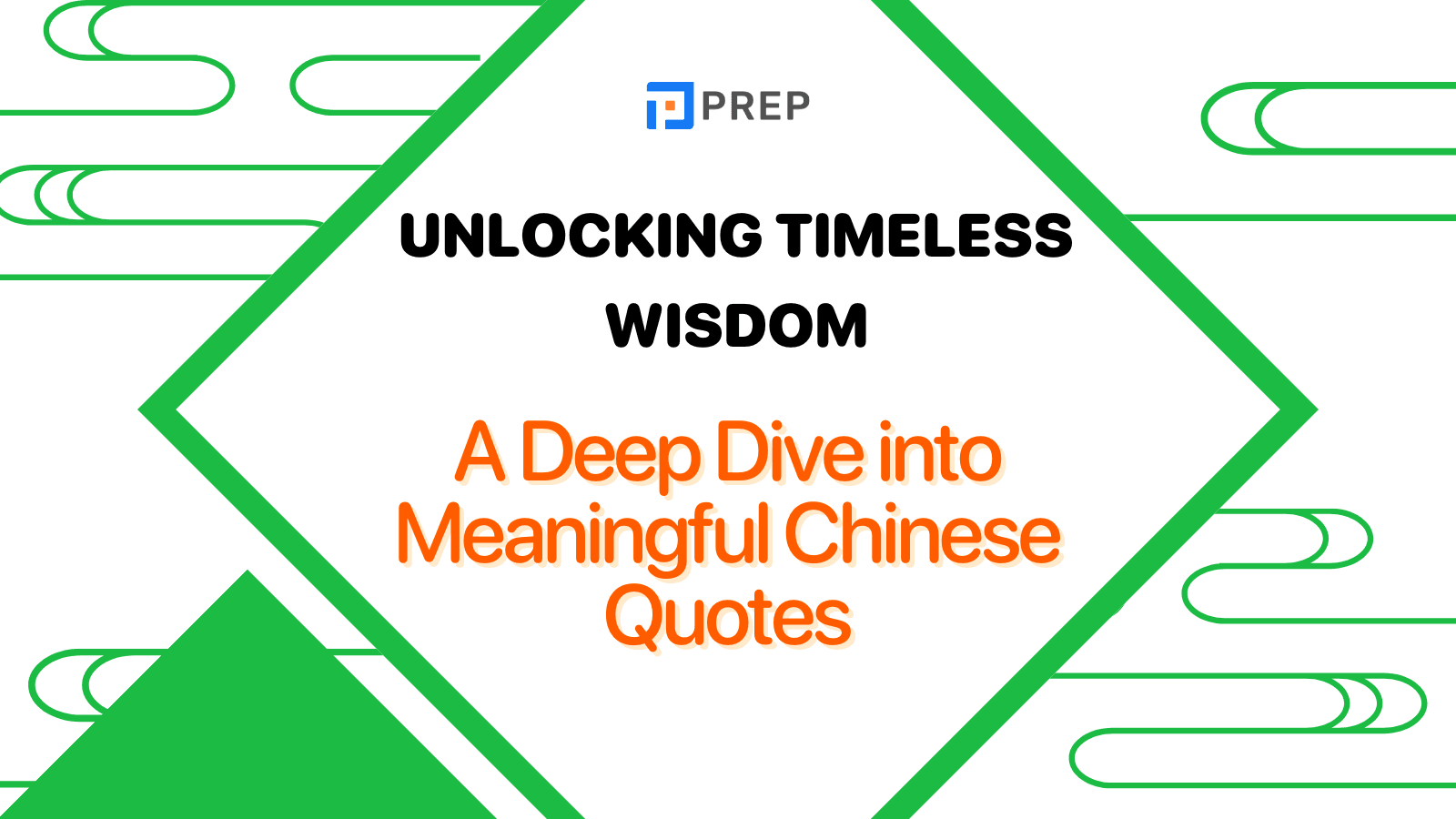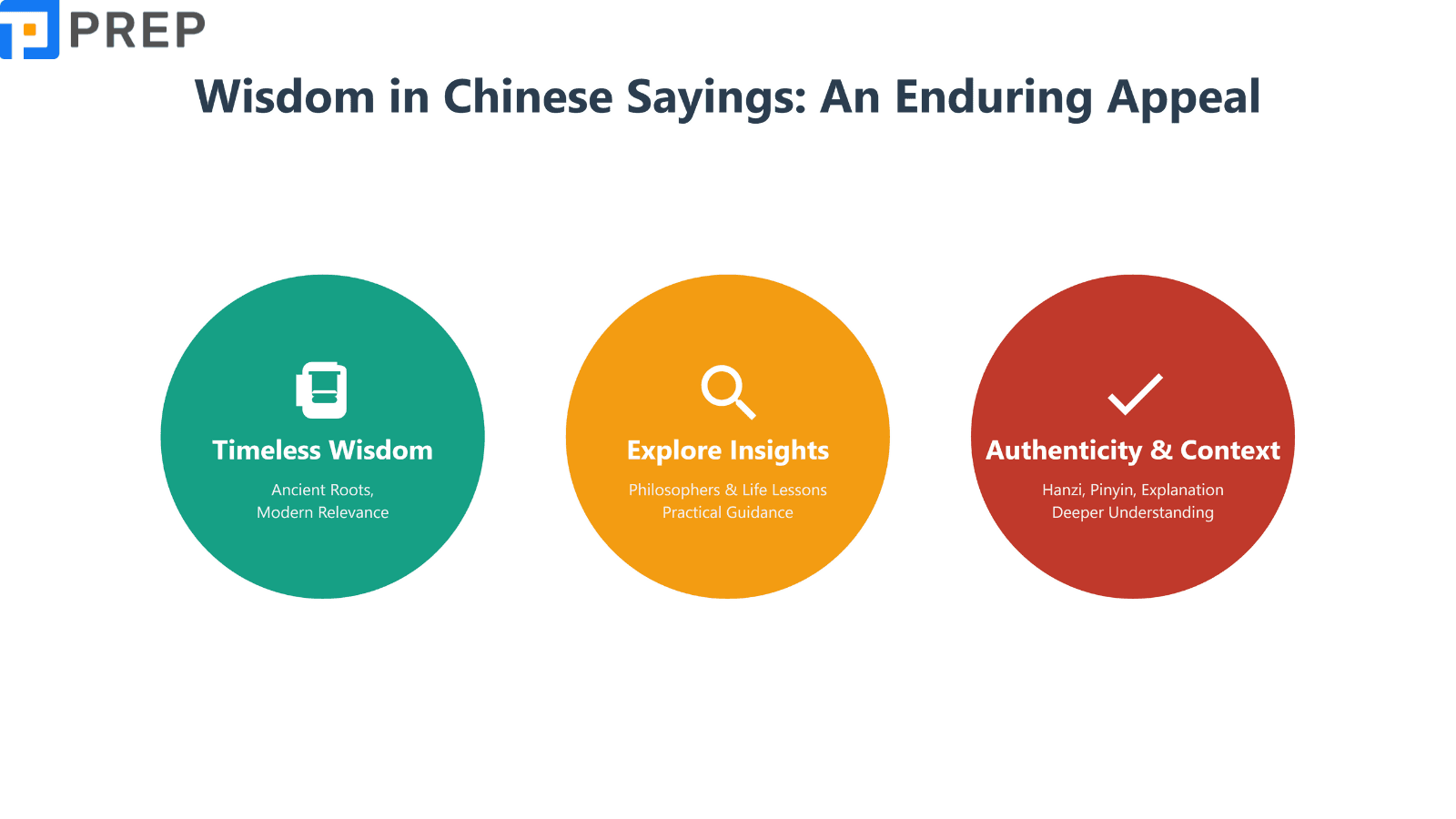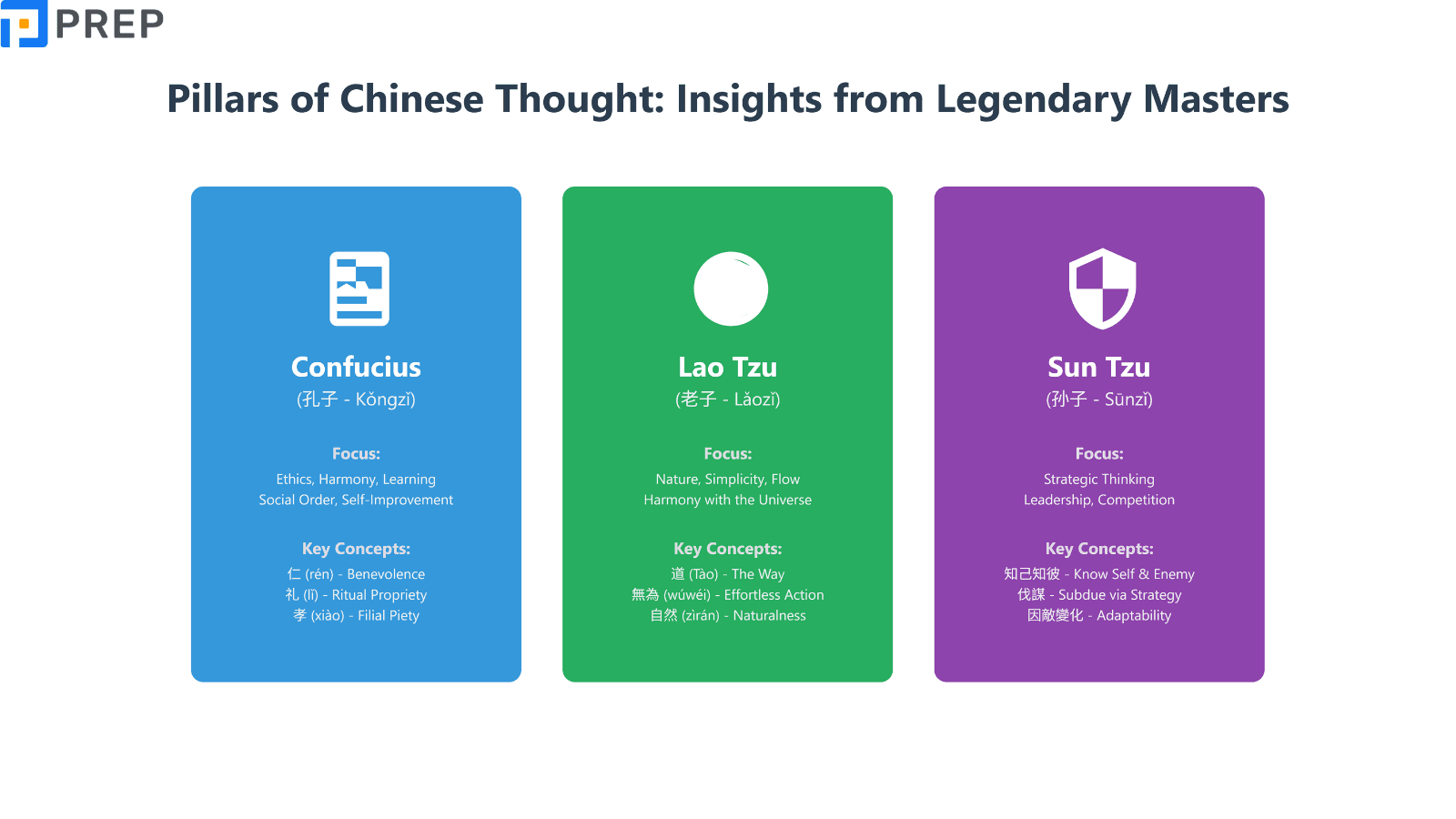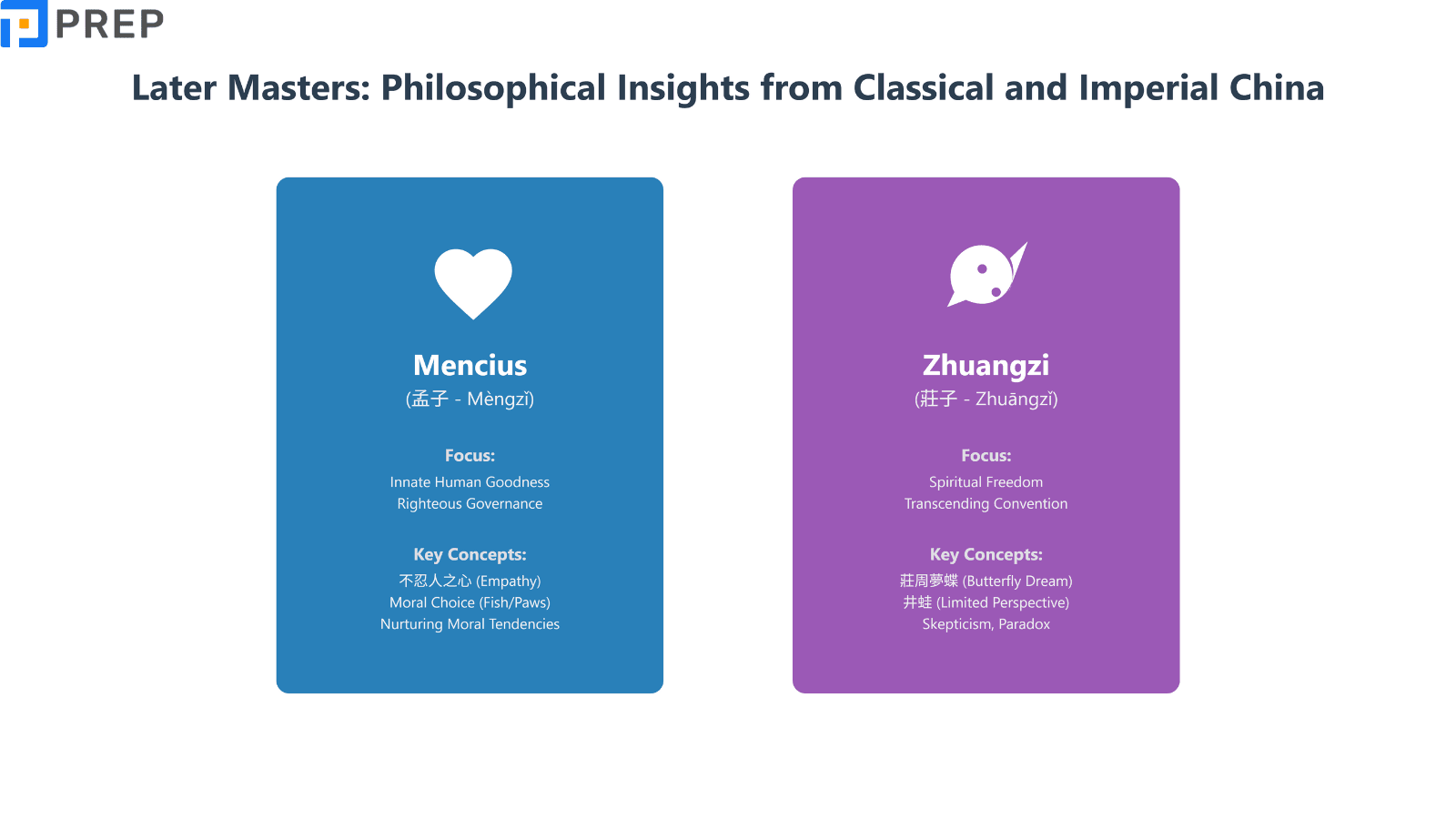Unlocking Timeless Wisdom: A Deep Dive into Meaningful Chinese Quotes
Ancient Chinese philosophy offers a treasure trove of wisdom that continues to guide and inspire people worldwide. This comprehensive exploration takes you through the most profound Chinese quotes from legendary thinkers like Confucius, Lao Tzu, and Sun Tzu, examining their original context and modern applications. From famous Chinese quotes about perseverance to Chinese quotes about happiness, these timeless expressions provide practical insights for navigating life's challenges while developing a deeper understanding of ourselves and our relationships with others.
- I. The Enduring Appeal: Why We Seek Wisdom in Chinese Sayings
- II. Pillars of Chinese Thought: Insights from Legendary Masters
- III. Later Masters: Philosophical Insights from Classical and Imperial China
- IV. Modern Resonance: Timeless Quotes for Life's Journey
- V. Beyond the Words: Appreciating Nuance in Translation & Culture
- VI. Embracing the Wisdom: Integrating Insights into Your Worldview

I. The Enduring Appeal: Why We Seek Wisdom in Chinese Sayings

1. Echoes of Antiquity, Relevance for Today
Chinese quotes have transcended millennia, offering insights that remain remarkably relevant in our modern world. These ancient expressions contain universal truths about human nature, society, and the pursuit of fulfillment that continue to resonate across cultural boundaries. The allure of Chinese quotes lies in their remarkable ability to distill complex philosophical concepts into concise, memorable expressions that offer practical guidance for navigating life's challenges. Through these Chinese quotes, we discover wisdom that speaks to both the challenges of ancient times and the complexities of contemporary life.
2. What You'll Discover: From Philosophers to Modern Thinkers
This exploration will take you through the rich landscape of Chinese wisdom, focusing on the reflections of great thinkers who have shaped both Eastern and Western thought. You'll encounter profound Chinese quotes about life that address universal themes of perseverance, learning, relationships, and personal development. We'll examine famous Chinese quotes that continue to influence contemporary thinking, offering fresh perspectives on timeless questions about how to live well and find meaning. Many Chinese sayings about life provide practical guidance that remains applicable regardless of cultural background or historical period.
3. Our Commitment to Authenticity & Context
Understanding these Chinese quotes requires more than simple translation. Each quote presented includes the original Chinese characters (Hanzi), pronunciation guidance (Pinyin), and contextual explanations that reveal the deeper meanings and cultural significance. This approach ensures you grasp not just the words but the philosophical frameworks and historical contexts from which these Chinese quotes emerged. Some Chinese sayings in Chinese retain additional layers of meaning that become accessible only when we understand the cultural context that produced them.
II. Pillars of Chinese Thought: Insights from Legendary Masters

1. Confucius (孔子 - Kǒngzǐ): Wisdom on Ethics, Harmony, and Learning
Confucius (551-479 BCE) stands as the most influential philosopher in Chinese history. His teachings, collected in the Analects, established the foundation for social ethics, governmental principles, and educational philosophy that shaped Chinese civilization for over two thousand years. Many famous Chinese quotes originate from his conversations with disciples, preserved through careful oral transmission before being written down.
1.1. Key Teachings & Context Briefly Explained
Confucian philosophy centers on several key concepts that appear throughout his Chinese quotes. The principle of 仁 (rén) - benevolence or humaneness - forms the core of his ethical system. Confucius believed this virtue manifests through proper relationships governed by 礼 (lǐ) - ritual propriety or appropriate behavior based on one's position in society. Another critical value is 孝 (xiào) - filial piety - which emphasizes respect and care for parents and ancestors as the foundation of social harmony. These concepts intertwine with Confucius's emphasis on education, self-improvement, and moral leadership.
1.2. Foundational Quotes
• "學而不思則罔,思而不學則殆。" (Xué ér bù sī zé wǎng, sī ér bù xué zé dài.) Translation: "Learning without thought is labor lost; thought without learning is perilous."
This famous Chinese quote emphasizes the complementary nature of study and reflection. Confucius warns that accumulating knowledge without contemplating its meaning leads to confusion, while theoretical speculation without factual foundation creates dangerous misconceptions. This balanced approach mirrors effective educational philosophy of combining knowledge acquisition with practical application.
• "己所不欲,勿施於人。" (Jǐ suǒ bù yù, wù shī yū rén.) Translation: "Do not impose on others what you yourself do not desire."
This Chinese quote about life articulates the principle of reciprocity found in many ethical traditions. Rather than imposing abstract moral rules, Confucius grounds ethics in our common humanity. By using our own feelings as a guide for treating others, we naturally create harmony. This quote demonstrates how Chinese wisdom often offers practical guidance rather than rigid commandments.
• "三人行,必有我師焉。" (Sān rén xíng, bì yǒu wǒ shī yān.) Translation: "Among any three people walking, I will find someone to learn from."
This humble approach to learning reflects Confucius's belief that wisdom can be found everywhere if we remain open to instruction. By recognizing that every person possesses knowledge or qualities worthy of emulation, we cultivate both humility and continuous improvement - a principle that resonates with the commitment to lifelong learning.
• "知之者不如好之者,好之者不如樂之者。" (Zhī zhī zhě bù rú hào zhī zhě, hào zhī zhě bù rú lè zhī zhě.) Translation: "They who know the truth are not equal to those who love it, and they who love it are not equal to those who delight in it."
This Chinese quote about happiness reveals Confucius's understanding that intellectual knowledge alone is insufficient. True wisdom requires emotional engagement and ultimately, joy in the pursuit of understanding. This progression from knowing to loving to delighting shows how authentic learning transforms the entire person, not merely their intellect. Few funny Chinese sayings come from Confucius, as his teachings generally maintained a serious tone appropriate to their ethical subject matter.
2. Lao Tzu (老子 - Lǎozǐ) & The Tao: Embracing Nature, Simplicity, and Flow
Lao Tzu, the legendary founder of Taoism, is traditionally credited with writing the Tao Te Ching (道德經) in the 6th century BCE. This brief but profound text offers a philosophical counterpoint to Confucian thought, emphasizing harmony with nature and the discovery of wisdom through paradox and simplicity.
2.1. Core Concepts of Taoism Briefly Explained
Taoist philosophy revolves around the concept of 道 (Tào) - the Way - which represents the ineffable natural order of the universe. Rather than attempting to control or manipulate this order, Taoism advocates 無為 (wúwéi) - non-action or effortless action - aligning oneself with the natural flow rather than struggling against it. The principle of 自然 (zìrán) - naturalness - encourages authenticity and spontaneity by following one's true nature. Many Chinese quotes from Taoism express these abstract concepts through paradox and natural metaphors, using water, valleys, and uncarved blocks to illustrate philosophical truths.
2.2. Foundational Quotes
• "千里之行,始於足下。" (Qiān lǐ zhī xíng, shǐ yú zú xià.) Translation: "A journey of a thousand miles begins with a single step."
This widely-known Chinese inspirational quote conveys the importance of beginning difficult undertakings without being overwhelmed by their magnitude. It embodies the Taoist principle that great achievements arise naturally from simple beginnings. The quote encourages taking action without anxious calculation about distant outcomes, trusting in the process of gradual progress.
• "上善若水。水善利萬物而不爭。" (Shàng shàn ruò shuǐ. Shuǐ shàn lì wàn wù ér bù zhēng.) Translation: "The highest good is like water. Water benefits all things without striving."
This Chinese quote about life uses water as a metaphor for the ideal approach to existence. Water nourishes all life without discrimination, flows to the lowest places without resistance, and shapes even the hardest stone through persistence rather than force. This image captures the Taoist values of humility, adaptability, and effortless effectiveness that arise from working with natural principles rather than against them.
• "知人者智,自知者明。勝人者有力,自勝者強。" (Zhī rén zhě zhì, zì zhī zhě míng. Shèng rén zhě yǒu lì, zì shèng zhě qiáng.) Translation: "Knowing others is intelligence; knowing yourself is true wisdom. Mastering others is strength; mastering yourself is true power."
This famous Chinese quote highlights the Taoist emphasis on self-understanding and self-mastery as superior forms of knowledge and strength. While conventional wisdom values social intelligence and power over others, Lao Tzu suggests that true wisdom comes from internal awareness and self-control. This inward focus creates a foundation for authentic living that doesn't depend on external validation.
• "為學日益,為道日損。損之又損,以至於無為。" (Wéi xué rì yì, wéi dào rì sǔn. Sǔn zhī yòu sǔn, yǐ zhì yú wúwéi.) Translation: "In pursuit of knowledge, every day something is added. In pursuit of the Tao, every day something is dropped. Less and less is done until non-action is achieved."
This Chinese quote about life contrasts conventional learning, which accumulates information, with the Taoist path, which removes unnecessary complexity to reveal essential truths. Rather than adding more knowledge, Lao Tzu suggests that wisdom comes from stripping away artificial constructs until we achieve the state of wúwéi (non-action) where actions arise naturally and effortlessly from our alignment with the Tao.
3. Sun Tzu (孙子 - Sūnzǐ): Strategic Thinking from "The Art of War"
Sun Tzu, a military strategist from the 5th century BCE, authored "The Art of War" (兵法), which transcends its original military context to offer insights applicable to competition, leadership, and conflict resolution across many domains.
3.1. Beyond Warfare: Applying Strategic Insight
Sun Tzu's strategic principles extend far beyond the battlefield. His emphasis on preparation, information gathering, psychological factors, and efficient use of resources applies to business competition, personal conflicts, and organizational leadership. The military metaphors in his Chinese quotes provide a framework for understanding any situation involving opposing interests or strategic challenges, making these ancient insights relevant to modern contexts from corporate strategy to personal development.
3.2. Foundational Quotes
• "知己知彼,百戰不殆。" (Zhī jǐ zhī bǐ, bǎi zhàn bù dài.) Translation: "Know yourself and know your enemy, and you will not be imperiled in a hundred battles."
This famous Chinese quote emphasizes that true strategic advantage comes from comprehensive understanding. Sun Tzu recognized that accurate self-assessment combined with thorough knowledge of opponents creates an unbeatable foundation for decision-making. This principle applies equally to business competition, academic pursuits, or personal challenges, where clear understanding precedes effective action.
• "上兵伐謀,其次伐交,其次伐兵,其下攻城。" (Shàng bīng fá móu, qí cì fá jiāo, qí cì fá bīng, qí xià gōng chéng.) Translation: "The supreme art of war is to subdue the enemy without fighting."
This strategic Chinese saying reveals Sun Tzu's preference for winning through superior planning and diplomatic maneuvering rather than direct confrontation. By prioritizing strategic thinking and diplomatic solutions over force, Sun Tzu advocates for achieving objectives with minimal conflict and resource expenditure. This wisdom applies to modern conflict resolution and competitive situations where the most elegant solutions avoid destructive confrontation.
• "故善戰者,致人而不致於人。" (Gù shàn zhàn zhě, zhì rén ér bù zhì yú rén.) Translation: "The skilled warrior brings others to the battlefield but is not brought there by others."
This Chinese quote emphasizes the importance of maintaining strategic initiative rather than reacting to opponents' actions. By controlling the terms of engagement, one creates favorable conditions for success. This principle applies broadly to any competitive situation, suggesting that proactive positioning trumps reactive responses, allowing us to operate from positions of strength rather than weakness.
• "兵無常勢,水無常形,能因敵變化而取勝者,謂之神。" (Bīng wú cháng shì, shuǐ wú cháng xíng, néng yīn dí biànhuà ér qǔ shèng zhě, wèi zhī shén.) Translation: "Just as water retains no constant shape, in warfare there are no constant conditions. The one who can modify his tactics in relation to his opponent, and thereby succeed in winning, may be called divine."
This Chinese inspirational quote uses water as a metaphor for strategic adaptability. Rather than adhering to fixed tactics, Sun Tzu advocates responsive flexibility that adjusts to changing circumstances. This principle of strategic adaptability applies to any dynamic situation where success depends on responding intelligently to evolving conditions rather than following rigid formulas.
III. Later Masters: Philosophical Insights from Classical and Imperial China

1. Mencius (孟子 - Mèngzǐ): The Nature of Humanity and Righteous Governance
Mencius (372-289 BCE), considered the second most influential Confucian philosopher, expanded on his predecessor's teachings with a more systematic approach to ethics and political theory. His Chinese quotes about life often focus on human nature and virtuous governance.
Foundational Quotes
• "魚,我所欲也;熊掌,亦我所欲也。二者不可得兼,舍魚而取熊掌者也。" (Yú, wǒ suǒ yù yě; xióng zhǎng, yì wǒ suǒ yù yě. Èr zhě bù kě dé jiān, shě yú ér qǔ xióng zhǎng zhě yě.) Translation: "I desire fish, and I also desire bear's paws. If I cannot have both, I will give up the fish and take the bear's paws."
This Chinese quote about life addresses the nature of ethical decision-making. Mencius uses this culinary metaphor to illustrate how we must sometimes choose between competing desires based on their relative importance. The quote demonstrates the Confucian understanding that moral development involves cultivating proper priorities and making principled choices rather than simply following rules.
• "人皆有不忍人之心。" (Rén jiē yǒu bù rěn rén zhī xīn.) Translation: "All people have a heart that cannot bear to see the suffering of others."
This famous Chinese quote encapsulates Mencius's belief in the innate goodness of human nature. He argues that empathy forms the basis of morality, as evidenced by our natural reaction to witnessing suffering. This optimistic view of human potential suggests that ethical development involves nurturing these natural moral tendencies rather than overcoming inherent selfishness.
2. Zhuangzi (莊子 - Zhuāngzǐ): Freedom Through Transcending Conventional Thinking
Zhuangzi (369-286 BCE) developed Taoist philosophy in new directions, using humor, paradox, and imaginative stories to challenge conventional thinking and promote spiritual freedom. Some of the most intellectually playful and funny Chinese sayings come from his writings, which use absurdity and imagination to make philosophical points.
Foundational Quotes
• "莊周夢蝶,胡蝶為莊周與?" (Zhuāng Zhōu mèng dié, hú dié wéi Zhuāng Zhōu yǔ?) Translation: "Zhuang Zhou dreamed he was a butterfly. But was he Zhuang Zhou dreaming he was a butterfly, or a butterfly dreaming he was Zhuang Zhou?"
This Chinese quote questions fundamental assumptions about identity and reality. Through this famous butterfly dream, Zhuangzi challenges our certainty about the nature of consciousness and the boundaries between self and other. This philosophical skepticism invites us to hold our perspectives lightly and remain open to alternative ways of understanding reality.
• "井蛙不可以語於海者,拘於虛也;夏蟲不可以語於冰者,篤於時也。" (Jǐng wā bù kě yǐ yǔ yú hǎi zhě, jū yú xū yě; xià chóng bù kě yǐ yǔ yú bīng zhě, dǔ yú shí yě.) Translation: "You cannot speak of the ocean to a well frog - he is limited by his space. You cannot speak of ice to a summer insect - he is limited by his season."
This Chinese quote about life illustrates how our perspectives are limited by our experiences. The well frog cannot comprehend the ocean's vastness; the summer insect cannot understand winter's ice. This metaphor reminds us that our understanding is shaped by our circumstances, encouraging intellectual humility and openness to broader perspectives beyond our immediate experience.
IV. Modern Resonance: Timeless Quotes for Life's Journey
1. Reflections on Life, Effort & Overcoming Challenges
Chinese quotes offer particularly valuable insights on navigating life's inevitable difficulties with resilience and perspective. These Chinese quotes combine pragmatic advice with philosophical depth to provide guidance through personal struggles.
• "千磨万击还坚劲,任尔东西南北风。" (Qiān mó wàn jī hái jiān jìng, rèn ěr dōng xī nán běi fēng.) Translation: "After countless tests still standing strong, let the winds blow from all directions."
This Chinese quote about life from Song dynasty poet Su Shi celebrates inner resilience amidst external pressures. Like a bamboo that bends but doesn't break, true strength comes from flexibility coupled with an unshakable core. This wisdom reminds us that challenges test and reveal our character rather than defining it.
• "天行健,君子以自强不息。" (Tiān xíng jiàn, jūnzǐ yǐ zìqiáng bùxī.) Translation: "As heaven maintains vigor through movements, a superior person maintains strength through persistence."
This quote from the I Ching (Book of Changes) draws inspiration from natural cycles to encourage continuous self-improvement. Just as the universe remains dynamic through constant motion, personal development requires ongoing effort regardless of external circumstances. This Chinese saying about life celebrates the value of self-reliance and internal motivation.
• "不畏浮云遮望眼,自緣身在最高層。" (Bù wèi fú yún zhē wàng yǎn, zì yuán shēn zài zuì gāo céng.) Translation: "Fear not the clouds that block your view, for you yourself are at the highest point."
This Chinese inspirational quote from Song dynasty poet Wang Anshi uses mountain imagery to express psychological perspective. Temporary obstacles (clouds) may obscure our vision, but with proper perspective, we can rise above them. The quote encourages maintaining a broader viewpoint during challenging times, recognizing that difficulties are often temporary and limited in their scope.
2. Insights on Love, Friendship & Human Connection
Chinese quotes offer nuanced perspectives on human relationships that balance emotional fulfillment with ethical responsibility and practical wisdom.
• "桃花潭水深千尺,不及汪伦送我情。" (Táohuā tán shuǐ shēn qiān chǐ, bù jí Wāng Lún sòng wǒ qíng.) Translation: "The waters of Peach Blossom Pool are a thousand feet deep, but not as deep as Wang Lun's friendship."
This poetic Chinese quote from Tang dynasty poet Li Bai uses natural imagery to express the profound depth of true friendship. By comparing emotional bonds to measurable physical depth, the quote suggests that genuine human connection transcends material measurement, creating a vivid metaphor for the importance of meaningful relationships.
• "君子之交淡如水。" (Jūnzǐ zhī jiāo dàn rú shuǐ.) Translation: "The friendship between noble persons is as plain as water."
This Confucian Chinese saying in Chinese describes ideal friendship as pure, transparent, and essential like water - free from unnecessary ornamentation or ulterior motives. The quote suggests that meaningful relationships should be based on genuine character rather than superficial attractions or temporary advantages, creating bonds that remain refreshing and sustaining over time.
• "得一知己,可抵千军万马。" (Dé yī zhījǐ, kě dǐ qiān jūn wàn mǎ.) Translation: "Finding someone who truly understands you is worth more than armies of thousands."
This Chinese quote about happiness emphasizes the incomparable value of deep understanding in relationships. It suggests that being truly known and accepted by even one person provides more strength and comfort than external power or resources. This wisdom recognizes the fundamental human need for authentic connection and validation.
3. Perspectives on Dreams, Youth & Making the Most of Time
Chinese quotes offer particular insight on the relationship between time, opportunity, and personal development, encouraging mindful engagement with life's possibilities.
• "少壮不努力,老大徒伤悲。" (Shào zhuàng bù nǔlì, lǎo dà tú shāng bēi.) Translation: "If you don't work hard in your youth, you'll regret it in old age."
This Chinese saying about life creates urgency around utilizing the energy and opportunity of youth. Rather than pressuring young people, it compassionately warns against the genuine regret that comes from wasted potential. Like the emphasis on building strong foundations early in the learning process, this quote recognizes that early investments yield compounding returns.
• "人生自古谁无死,留取丹心照汗青。" (Rénshēng zì gǔ shuí wú sǐ, liú qǔ dān xīn zhào hàn qīng.) Translation: "Since ancient times, who has not died? But I shall leave my loyal heart shining in history."
This famous Chinese quote from Song dynasty poet Wen Tianxiang transcends the fear of mortality by focusing on meaningful legacy. Rather than pursuing immortality through longevity, it suggests creating lasting impact through principled living. This perspective shifts attention from the duration of life to its quality and significance.
• "今日复今日,今日何其少!今日又不为,此事何时了?" (Jīnrì fù jīnrì, jīnrì hé qí shǎo! Jīnrì yòu bù wéi, cǐ shì hé shí liǎo?) Translation: "Today and again today, how few such todays we have! If today we do not act, when will this matter be completed?"
This Chinese inspirational quote presents an urgent call to present action rather than future planning or past regret. By emphasizing the finite nature of "todays," it creates healthy pressure to engage fully with current opportunities rather than postponing meaningful action. This wisdom complements the focus on consistent, purposeful study habits in effective learning approaches.
V. Beyond the Words: Appreciating Nuance in Translation & Culture
1. Why Literal Translations Can Be Misleading
Direct translations often fail to capture the richness of Chinese quotes because of fundamental differences in language structure, cultural references, and philosophical backgrounds. A classical Chinese expression might contain allusions to historical events, literary works, or philosophical concepts that require paragraphs of explanation in English. The economy of classical Chinese allows ideas to be expressed with remarkable concision, often lost in translation. Without context, translated Chinese quotes may seem simplistic or confusing when they actually contain sophisticated insights developed within specific cultural and philosophical frameworks.
2. The Importance of Cultural and Historical Context
Chinese quotes emerge from specific philosophical traditions, historical circumstances, and cultural values that shape their meaning. Confucian sayings reflect hierarchical social structures and communal responsibilities that differ from Western individualism. Taoist quotes often contain paradoxes that challenge logical interpretation but make sense within cyclical rather than linear thinking patterns. Understanding these frameworks transforms potentially exotic curiosities into applicable wisdom. Just as effective language instruction provides cultural context alongside grammar and vocabulary, appreciating Chinese quotes requires engagement with the worldviews that produced them.
3. Moving from Reading to Understanding
True appreciation of Chinese wisdom requires moving beyond passive consumption to active engagement with the ideas presented. Consider how these perspectives might complement or challenge your own assumptions about life, relationships, and success. Notice patterns across different philosophical traditions, and reflect on how these ancient insights might apply to contemporary challenges. This deeper engagement transforms interesting Chinese quotes into practical wisdom that enriches your perspective, just as comprehensive learning transforms language knowledge into communicative competence through active application.
VI. Embracing the Wisdom: Integrating Insights into Your Worldview
1. From Ancient Scrolls to Modern Application
The journey through Chinese quotes reveals wisdom that transcends both time and cultural boundaries. While these sayings emerged from specific historical contexts and philosophical traditions, they address universal human experiences - the pursuit of virtue, the nature of relationships, the challenge of adversity, and the search for meaning. Their continued relevance demonstrates how fundamental insights about human nature remain consistent despite technological and social changes. Just as effective education builds bridges between languages and cultures, these Chinese quotes create connections between ancient wisdom and contemporary challenges, offering frameworks for navigating our complex world.
2. The Continuous Journey of Learning & Reflection
True engagement with Chinese wisdom resembles the learning approach described by Confucius himself - a continuous process of study, reflection, and application that deepens understanding over time. Rather than treating these Chinese quotes as static maxims, consider them as starting points for ongoing contemplation and practice. Notice how different sayings resonate at different life stages and how their meanings unfold through experience. This approach transforms Chinese quotes from exotic curiosities into practical tools for self-development and understanding. The ancient sages who originated these insights would recognize this approach as the ultimate purpose of their teachings - not preservation of their words, but continuation of the wisdom they represent.
The enduring power of Chinese quotes lies in their remarkable ability to distill profound wisdom into concise, memorable expressions that speak to universal human experiences. Whether reflecting on Chinese sayings about life from Confucius, finding inspiration in Taoist metaphors, or applying Sun Tzu's strategic insights to modern challenges, these ancient words continue to offer guidance across cultural and temporal boundaries. By engaging deeply with these expressions—understanding not just their literal translations but their philosophical and cultural contexts—we gain access to wisdom that remains as relevant today as when first spoken. The journey through Chinese philosophical thought invites us to incorporate these insights into our own worldview, creating a continuous dialogue between ancient wisdom and contemporary life that enriches our understanding and expands our perspective.

Hi I'm Chloe, and I am currently serving as an Product Content Administrator at Prep Education. With over five years of experience in independent online IELTS study and exam preparation, I am confident in my ability to support learners in achieving their highest possible scores.
Comment
Premium content
View allPersonalized roadmap
Most read












